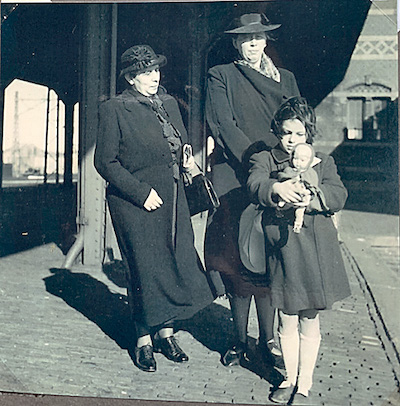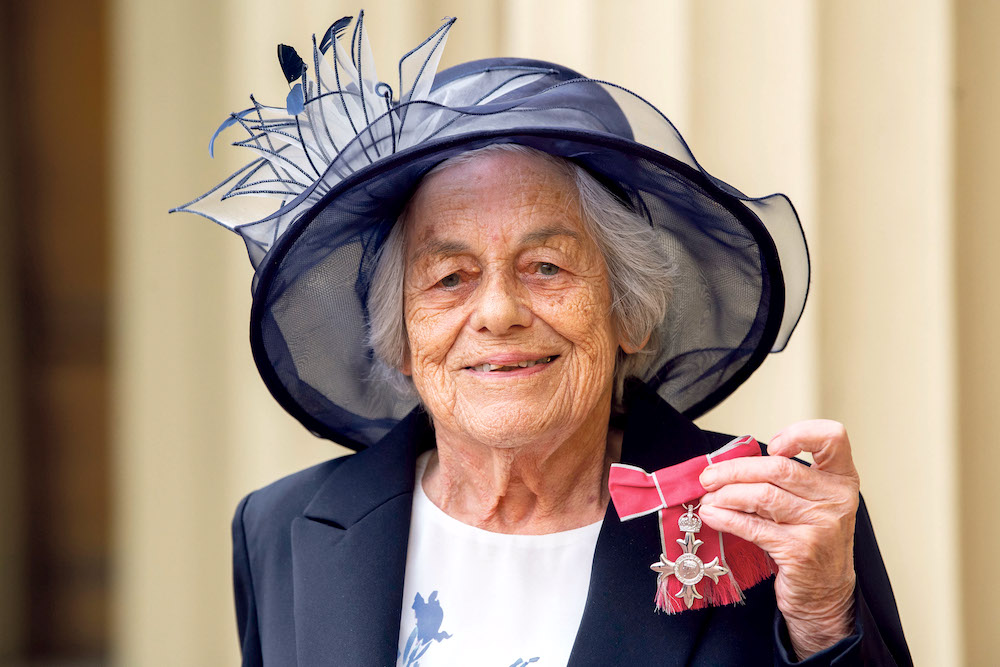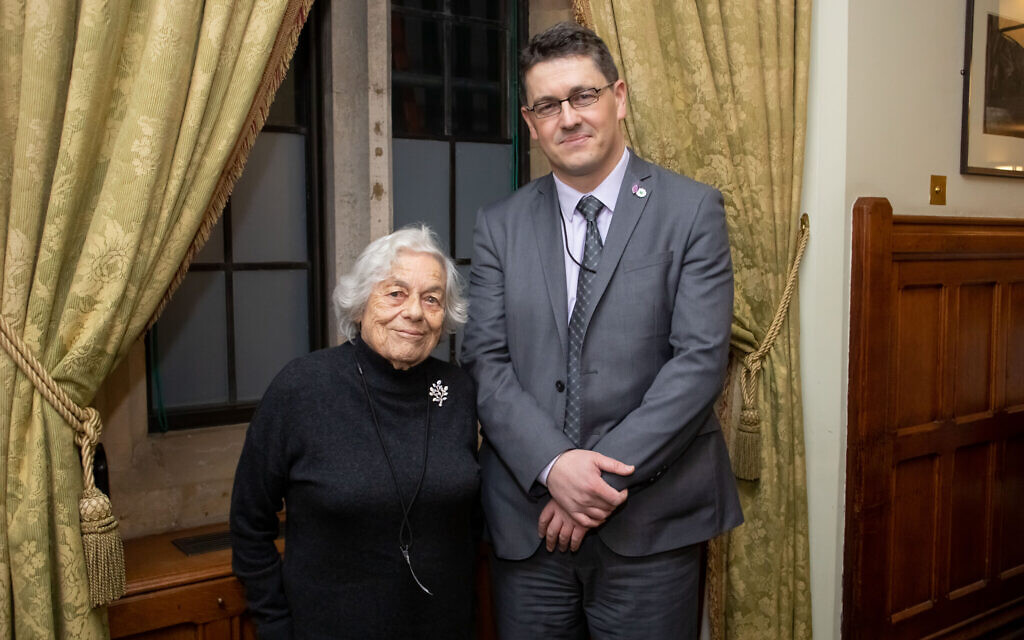Islamophobia and antisemitism go hand in hand, warn child refugees of genocide
Kindertransport survivor Vera Schaufeld and Bosnian refugee survivor Safet Vukalic share their testimony in interview with Jewish News ahead of Holocaust Memorial Day
One of 669 children rescued on Sir Nicholas Winton’s Kindertransport, Vera fled the Nazi invasion of the former Czechoslovakia at the age of nine. She waved goodbye to her parents from the train window as they stood behind the barriers at Prague Station. That was the last time she saw either of them. They were murdered in Trawniki, a sub-camp of Majdanek (Lublin) extermination camp. Vera, now a grandmother of four, received an MBE from Prince William last year for services to Holocaust education.
Safet was 16 when soldiers stormed into his native Prijedor in 1992 to arrest all non-Serbian and non-Orthodox Christian men in the Bosnian town (he is Muslim). His father and older brother were deported to several concentration camps, but survived. Safet and the rest of his family escaped Bosnia in stages and were reunited in London in 1994. Now an accounts assistant and dad of two, he was awarded a BEM for services to genocide education in the 2020 New Year Honours.
Gathered around the coffee table in Vera’s living room, the two look back as the world marks 25 years since the Srebrenica massacre and the 75th anniversary of the liberation of Auschwitz–Birkenau.
Get The Jewish News Daily Edition by email and never miss our top stories Free Sign Up
Jewish News: You both fled before some of the worst atrocities. Has that experience influenced your determination to mark Holocaust Memorial Day?
Safet: I left in the middle of it, in the summer of 1993, after everything kicked off in May 1992, so I spent some time there during the war and concentration camps. It’s the fact that I’ve been lucky enough. My dad survived three concentration camps, my brother survived two. We’ve all survived, we’ve all managed to get out. Justice is a hard thing to ask for, but it’s that sense of recognition. You want to make sure people know what happened, but also hopefully that the people who did this finally say, “yes, the regime at the time did this.”

Vera: I felt this commitment for a very long time because my experience of having to leave my family and my home always seemed to me somehow lesser than the terrible experience of my husband, who, at the age of 13 in Poland, lost his education and spent his adolescence in Auschwitz, Buchenwald and many forced labour camps. So it took me a long time to really feel that my Kindertransport – which hadn’t been easy, and I lost my family, and so on – was as meaningful in its own way for me as the unimaginable experiences that my husband suffered.
JN: Vera, your parents sent you on the Kindertransport. What was that like, and how important is it to pay tribute to them?
Vera: My mother met me outside school, which was very unusual, and took me to a park and sat me on a little bench and said that they couldn’t leave Czechoslovakia – they didn’t have permission – but told me there were trains taking children to a country called England, which I’d never heard of. And that I would be with a family who would look after me, but as soon as they could, my parents would join me. They’d had to give £50 for the English government, so that anywhere in the world where they might be, the money would be there for me to join them. My mother explained this to me and said that, you know, we would be together as soon as possible. But in the meantime, I had to be very brave and go to this country called England.

Safet: In school before the war, when it came to the Holocaust, to us it was a history lesson. You learn the number of people who were killed, where concentration camps were, those kinds of things. You never had contact with individuals. When I started working with the Holocaust Memorial Day Trust, I had the honour and pleasure of meeting a number of survivors and then realising they were younger than I was during the Bosnian War… Leaving your parents behind or your siblings, this is not something you want to happen to anyone.
JN: Safet, you’ve said your mother saved your life. Can you tell us what happened?
Safet: I always say that my mum saved my life because of what happened when soldiers came to our street and called for all men to come out, meaning all non-Serbs – it was a predominantly Muslim area. So all the men started walking up the road, with soldiers saying: “We’ll just question you and you’ll be returned.” You don’t argue with the army.
I was 16 at the time, so I was quite tall. I used to say up until recently that my mum shouted at me, but I can’t say that [laughs]. So I’ve changed it to “My mum raised her voice at me.” She said, “Come back, you’re just a child. What are they gonna do with you?” So I just went back to the house. And I believe that saved my life. Had I gone, I believe I wouldn’t have had the strength to deal with what you have to deal with to survive the concentration camps.
JN: You’ve also praised the actions of Bosnian Serbs who helped you.
Safet: In terms of the neighbours and friends who were Serbs, a soldier who was a friend of a friend came over one day. This was when my dad and brother were in a concentration camp. He came over for coffee and, during our conversation, I mentioned I had bronchitis. And this guy, who I’d never met before, when everyone had left, came back with medication for me…
It is one of the things I tend to mention when I’m talking about what
the Serbian regime did; I did not forget the individuals who tried, in a way, to make a difference.
Vera: I just wanted to say to you that my daughter’s Bosnian friend had a Muslim mother and a Christian Serb father, so that means in a period before that people could intermarry. And then when this started, you know, it was impossible for her parents, and she and her boyfriend got to England, but it was a terrible thing to be living in Serbia in a split family.
Safet: Yes, so many examples. Some people thought things weren’t going to kick off in Bosnia because of that… It was so mixed in terms of the families, the friendships. Our neighbour was a Muslim married to a Serbian woman who was Orthodox Christian. She even had a sign at her house saying ‘Serbian house’, but he was still taken to a concentration camp. He was badly beaten – I think half of his ear was missing.
Vera: Unimaginable…
JN: Are Jewish and Muslim communities doing enough together to preserve the memories of genocides?
Safet: It’s been very pleasing to see the engagement of both communities to remember the Holocaust and genocide in Bosnia, and learn from it, not just on the anniversary dates, but throughout the year.
Vera: We are still in a situation where other communities are suffering and having terrible, terrible times, and I especially value what the charity Safe Passage is doing in trying to help children, and a lot of them I think are Muslim, who are living in appalling conditions and trying to join their families who are in England.
JN: Will the memories of the Holocaust and Srebrenica be passed on?
Safet: That’s the one thing I’m hoping for… and that there will be more of an understanding of how these things start so you can hopefully prevent things from getting worse when they do start, but also understand what people go through and make sure there is more respect towards immigrants and refugees. We didn’t ask for these things. We didn’t ask to leave Czechoslovakia and Bosnia, and to be used and abused for someone’s political game is really hard to watch.
It’s been a struggle to watch these things recently, and it seems to be getting worse, the rise of Islamophobia and antisemitism, which goes hand in hand. And that’s what people need to realise, it’s not one or the
other. It’s both of them and not just in Europe. If you look at the US and what happened inNew Zealand, everywhere, it’s on the rise. We need to do more to make sure people understand what that does to the victims, the survivors, especially children. My best years as a 16-year-old shouldn’t have been spent dealing with war.
Vera: The work the Holocaust Memorial Day Trust and the Holocaust Educational Trust are doing is absolutely vital. More and more people are becoming involved and are beginning to understand what’s happening. And I like you have found it so valuable to go into schools and to get the kind of positive reaction.
Vera aged nine on her way to England, and inset, Safet as a youngster

Thank you for helping to make Jewish News the leading source of news and opinion for the UK Jewish community. Today we're asking for your invaluable help to continue putting our community first in everything we do.
For as little as £5 a month you can help sustain the vital work we do in celebrating and standing up for Jewish life in Britain.
Jewish News holds our community together and keeps us connected. Like a synagogue, it’s where people turn to feel part of something bigger. It also proudly shows the rest of Britain the vibrancy and rich culture of modern Jewish life.
You can make a quick and easy one-off or monthly contribution of £5, £10, £20 or any other sum you’re comfortable with.
100% of your donation will help us continue celebrating our community, in all its dynamic diversity...
Engaging
Being a community platform means so much more than producing a newspaper and website. One of our proudest roles is media partnering with our invaluable charities to amplify the outstanding work they do to help us all.
Celebrating
There’s no shortage of oys in the world but Jewish News takes every opportunity to celebrate the joys too, through projects like Night of Heroes, 40 Under 40 and other compelling countdowns that make the community kvell with pride.
Pioneering
In the first collaboration between media outlets from different faiths, Jewish News worked with British Muslim TV and Church Times to produce a list of young activists leading the way on interfaith understanding.
Campaigning
Royal Mail issued a stamp honouring Holocaust hero Sir Nicholas Winton after a Jewish News campaign attracted more than 100,000 backers. Jewish Newsalso produces special editions of the paper highlighting pressing issues including mental health and Holocaust remembrance.
Easy access
In an age when news is readily accessible, Jewish News provides high-quality content free online and offline, removing any financial barriers to connecting people.
Voice of our community to wider society
The Jewish News team regularly appears on TV, radio and on the pages of the national press to comment on stories about the Jewish community. Easy access to the paper on the streets of London also means Jewish News provides an invaluable window into the community for the country at large.
We hope you agree all this is worth preserving.
-
By Brigit Grant
-
By Laurent Vaughan - Senior Associate (Bishop & Sewell Solicitors)
-
By Laurent Vaughan - Senior Associate (Bishop & Sewell Solicitors)
-
By Laurent Vaughan - Senior Associate (Bishop & Sewell Solicitors)
-
By Laurent Vaughan - Senior Associate (Bishop & Sewell Solicitors)






















